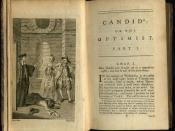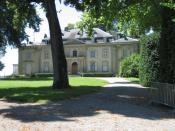The Garden of Enlightenment
A Place Where Knowledge Grows
"Theology amuses me. That's where we find the madness of the human spirit in all its plentitude." Voltaire was a true philosophe of the Age of Enlightenment. In turn, he enjoyed putting his views into writing. One of these writings was a dark satirical piece called Candide. Candide is the story of a young man (Candide), who is taught by his professor of "metaphysico-theologo-cosmolo-nigology" (Pangloss), that there is no effect without a cause, and that everything is for the best. Candide, who believes these teachings as he starts out in his life, comes into contact with many horrors and hardships because he never does anything to help himself for he believes that everything that happens is for the best and that everything will work out. It is only at the end of his journeys that he finally turns to Pangloss and says, "That is well said, but we must cultivate our garden."
By this statement, Voltaire is saying that in order for one to be happy, then one must work toward the causes that produce the effects one desires. You can not just sit back and accept what you are told. This statement means that you must question every aspect of the world and redefine it to be better, truer; you must become enlightened.
Voltaire was an admirer of many other great minds of his time, one of which being philosophe John Locke. From Locke's teachings, Voltaire learned not to accept what he was told. He learned that he should use his senses to form his own ideas about the world. For instance, the works of Sir Isaac Newton (whom Voltaire also had a high
regard for) were easily proved this way. If you step off of a...



What do i need a title for??
i can only agree that people rely on what other sources (media, peergroup ect.) to make up thier beliefs and thier perception of reality too much.
we have our senses see reality, and our own brain with which to think.
3 out of 3 people found this comment useful.